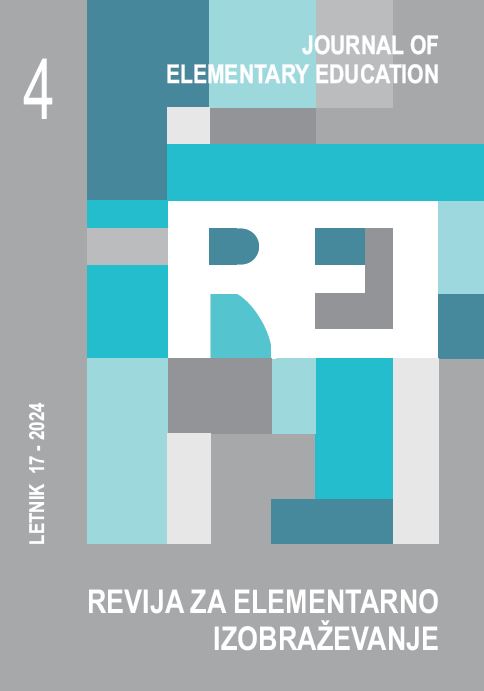Stress in the Preschool Profession: Action Research
DOI:
https://doi.org/10.18690/rei.3498Keywords:
experiential teaching, occupational stress, preschool teachers, values, well-being.Abstract
Stress has become an integral part of modern humans’ busy lives. One of the professions in which stress is highly prevalent is that of a preschool teacher. Therefore, action research was conducted in a higher education context aimed at reducing preschool teacher stress. After one month of introducing changes that met teachers’ interests and needs and realizing their baseline values, teacher stress was reduced. Moreover, the research produced multiple benefits on both the personal and professional levels. The paper points to the need to organize a motivating pedagogical environment in higher education, which will make positive changes in students’ lives and in their professional development.
Downloads
References
Brkić, I., and Rijavec, M. (2011). Izvori stresa, suočavanje sa stresom i životno zadovoljstvo učitelja razredne i predmetne nastave. Napredak, 152(2), 211–225. https://hrcak.srce.hr/82734
Bulent, A., Sariyev, H., and Odabasi, H. F. (2021). Critical Friendship in Self-Study. Journal of Qualitative Research in Education, 25, 316-334. https://doi.org/10.14689/enad.25.14
De Simone, S., Cicotto, G., and Lampis, J. (2016). Occupational stress, job satisfaction and physical health in teachers. European Review of Applied Psychology, 66(2), 65–77. http://dx.doi.org/10–.1016/j.erap.2016.03.002
European Agency for Safety and Health at Work. (2008). E-fact 31 - Prevention of work-related stress in the education sector. https://osha.europa.eu/sites/default/files/E-fact_31_-_Prevention_of_wo–rk-related_stress_in_the_education_sector.pdf
Fink, G. (2010). Stress: Definition and history. Stress Science: Neuroendocrinology, 3(9), 3–14.
Jukić, T., Tomić Kaselj, I., and Ružić, M. (2022). Akcijsko istraživanje u visokoškolskoj nastavi s ciljem poboljšanja kvalitete provođenja slobodnog vremena studenata u koronavirusnoj pandemiji. In A. Zovko, N. Vukelić, and I. Miočić (eds.), Prema postpandemijskom obrazovanju: kako osnažiti sustav odgoja i obrazovanja? (pp. 376–394). Sveučilište u Rijeci, Filozofski fakultet. https://i–zdavastvo.ffri.hr/wp-content/uploads/2023/04/Monografija_Prema-postpan–demijskom-obrazovanju.pdf
Kuhne, G. W., and Quigley, B. A. (1997). Understanding and Using Action Research in Practice Settings. New Directions for Adult and Continuing Education, 73, 23–40. https://doi.org/–10.1002/ace.7302
Kyriacou, C. (2001). Teacher Stress: Directions for future research. Educational Review, 53(1), 27-35.
Lovibond, S. H., and Lovibond, P. F. (1995). Manual for the Depression Anxiety Stress Scales (2nd. Ed.). Sydney: Psychology Foundation of Australia.
Lučanin, D. (2014). Mjere prevencije i sprečavanja štetnih posljedica stresa. Sigurnost, 56(3), 223–234. https://hrcak.srce.hr/127765
Mandarić Vukušić A., and Krstulović V. (2024). Job Satisfaction and Professional Burnout in Kindergarten Teachers. Journal of Elementary Education, 17(1), 37–51. https://doi.org/10.18–690/rei.2519
Matulović, I., Rončević, T., and Sindik, J. (2012). Stres i suočavanje sa stresom - primjer zdravstvenog osoblja. Sestrinski glasnik, 17(3), 174–177.
Močinić S., and Tatković S. (2021). Using Kolb’s Learning Model in Structured Types of Professional Education and Training for Teachers. Journal of Elementary Education, 14(4), 409–433. https://doi.org/10.18690/rei.14.4.409-433.2021
Nacionalni kurikulum za rani i predškolski odgoj i obrazovanje (2014). Ministarstvo znanosti, obrazovanja i sporta. https://www.azoo.hr/app/uploads/2020/12/Nacionalni-kurikulum-za-rani-i-pre–dskolski-odgoj-i-obrazovanje.pdf
Pavičić Dokota, K., Ćilić Burušić L., and Bakota, K. (2020). Prilog istraživanju nastavničkog stresa. Napredak, 161(3-4), 269-290. https://hrcak.srce.hr/file/363277
Pavlović, Ž., and Sindik, J. (2014). Situacijsko suočavanje sa stresom kod odgojitelja. Sigurnost, 56(3), 187–201. https://hrcak.srce.hr/127
Plavšić M., and Diković M. (2022). What is Most Difficult in a Teacher’s Job from the Perspective of Teachers, Students and Parents? Journal of Elementary Education, 15(1), 31–50. https://doi.org–/10.18690/rei.15.1.31-50.2022
Reić Ercegovac, I., and Penezić, Z. (2012). Skala depresivnosti, anksioznosti i stresa (DASS). In A. Proroković, V. Ćubela Adora, Z. Penezić, and I. Tucak Junaković (eds.), Zbirka psihologijskih skala i upitnika (Svezak 6) (pp. 17–24). Zadar: Sveučilište u Zadru.
Sindik, J., and Pavlović, Ž. (2016). Izvori stresa kod odgojiteljica predškolske djece I njihove osobine ličnosti. Sigurnost, 58(4), 291–310. https://doi.org/10.31306/s.58.4.3
Tatalović Vorkapić, S., and Lončarić, D. (2013). Posreduje li profesionalno sagorijevanje učinke osobina ličnosti na zadovoljstvo životom odgojitelja predškolske djece? Psihologijske teme, 22(3), 431–445. https://hrcak.srce.hr/111876
Tekavc J., and Vončina T. (2023). Parental Involvement in the Educational Process as a Potential Factor in Teachers’ Experience of Work Stress. Journal of Elementary Education, 16(3), 339–355. https://doi.org/10.18690/rei.16.3.3089
Travers, C. J., and Cooper, C. L. (1993). Mental health, job satisfaction and occupational stress among UK teachers. Work and Stress, 7(3), 203–219. https://doi.org/10.1080/02678379308257062
Vekić-Kljajić, V. (2022). Refleksivni praktikumi kao oblik profesionalnog razvoja odgojitelja. Marsonia: Journal of Social and Humanities Research, 1(1), 99–107. https://hrcak.srce.hr/281843
Whitehead, J. (1989). Creating a Living Educational Theory from Questions of the Kind, ‘How do I Improve my Practice?’ Cambridge Journal of Education, 19(1), 41–52. https://www.resear-chgate.net/publication/232928322_Creating_a_Living_Educational_Theory_from_Questions_of_the_Kind_’How_do_I_Improve_my_Practice’
World Health Organization. (2023, Feb 21). Stress. https://www.who.int/news-room/questions-and-answers/item/stress
Živčić-Bećirević, I., and Smojver-Ažić, S. (2005). Izvori stresa na poslu odgojitelja u dječjim vrtićima. Psihologijske teme, 14(2), 3–13. https://hrcak.srce.hr/11837
Downloads
Published
Issue
Section
License
Copyright (c) 2024 Tonća Jukić, Iskra Tomić Kaselj

This work is licensed under a Creative Commons Attribution 4.0 International License.
